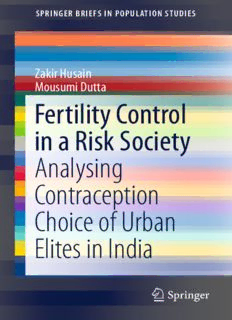
Fertility Control in a Risk Society: Analysing Contraception Choice of Urban Elites in India PDF
Preview Fertility Control in a Risk Society: Analysing Contraception Choice of Urban Elites in India
SPRINGER BRIEFS IN POPULATION STUDIES Zakir Husain Mousumi Dutta Fertility Control in a Risk Society Analysing Contraception Choice of Urban Elites in India 123 SpringerBriefs in Population Studies More information about this series at http://www.springer.com/series/10047 Zakir Husain Mousumi Dutta (cid:129) Fertility Control in a Risk Society Analysing Contraception Choice of Urban Elites in India 123 ZakirHusain Mousumi Dutta Humanities andSocial Sciences Department ofEconomics Indian Institute of Technology Kharagpur Presidency University Kharagpur, West Bengal Kolkata, West Bengal India India ISSN 2211-3215 ISSN 2211-3223 (electronic) SpringerBriefs inPopulation Studies ISBN978-81-322-3683-2 ISBN978-81-322-3685-6 (eBook) DOI 10.1007/978-81-322-3685-6 LibraryofCongressControlNumber:2016954592 ©TheAuthor(s)2017 Thisworkissubjecttocopyright.AllrightsarereservedbythePublisher,whetherthewholeorpart of the material is concerned, specifically the rights of translation, reprinting, reuse of illustrations, recitation, broadcasting, reproduction on microfilms or in any other physical way, and transmission orinformationstorageandretrieval,electronicadaptation,computersoftware,orbysimilarordissimilar methodologynowknownorhereafterdeveloped. The use of general descriptive names, registered names, trademarks, service marks, etc. in this publicationdoesnotimply,evenintheabsenceofaspecificstatement,thatsuchnamesareexemptfrom therelevantprotectivelawsandregulationsandthereforefreeforgeneraluse. The publisher, the authors and the editors are safe to assume that the advice and information in this book are believed to be true and accurate at the date of publication. Neither the publisher nor the authorsortheeditorsgiveawarranty,expressorimplied,withrespecttothematerialcontainedhereinor foranyerrorsoromissionsthatmayhavebeenmade. Printedonacid-freepaper ThisSpringerimprintispublishedbySpringerNature TheregisteredcompanyisSpringer(India)Pvt.Ltd. Theregisteredcompanyaddressis:7thFloor,VijayaBuilding,17BarakhambaRoad, NewDelhi110001,India To our mothers Acknowledgements ThestudywasmadepossiblebyafinancialgrantfromtheIndianCouncilofSocial Science Research (ICSSR), New Delhi, to Dr. Mousumi Dutta. We are grateful to ICSSR for this financial assistance. We are also grateful to Dr. Saswata Ghosh, Institute of Development Studies, Kolkata, for his help in analysing the National Family Health Survey data, con- structingtheStandardofLivingIndicesandoverallcommentsandsuggestions.His assistanceinwritingthepaperforAsianPopulationStudies(ZakirHusain,Saswata Ghosh&MousumiDutta,2013,‘UltramodernContraception’Re-Examined,Asian PopulationStudies,9:3,280–300,DOI:10.1080/17441730.2013.816480,http://dx. doi.org/10.1080/17441730.2013.816480),whichformedthebasisforChap.3,was invaluable. Permission to use this paper was kindly granted by Routledge and Dr. SaswataGhosh.WearealsogratefultoProf.T.K.RoyandProf.P.M.Kulkarnifor their comments on an early draft of the paper. Three anonymous reviewers also providedusefulcommentsandsuggestions.ThepaperwaspresentedattheSecond Conference of the Asian Population Association held at Bangkok in 2012. We receivedusefulsuggestionsfromGianpierroDallaZuanna,EleanoraHukin,andH. N. Nguyen. We are grateful to all of them. Two anonymous reviewers of the manuscript provided many useful comments andsuggestionsasalsodidtheSpringereditor,ShinjiniChatterjee.Wewouldlike torecordourgratitudetoallofthem.TheSpringerteamdeservesspecialthanksas theywereverypatientwhenwerepeatedlybrokedeadlines.Theynotonlygaveus more time without even one reproach, but also provided us with many useful suggestions in improving the readability and outreach of the monograph. Wewouldliketoexpressourgratitudetothefieldinvestigatorsandrespondents of the survey. In particular, the help extended by Mayurakshi Chakrabarty should be mentioned. vii viii Acknowledgements Finally,wewouldliketoexpressourgratitudetoourfamilyforbearingwithus in the difficult phase of writing when all family matters seem to pale into insignificance and the keyboard becomes our sole life. Any remaining errors remain our responsibility. Zakir Husain Mousumi Dutta About the Book This book analyses the reasons for relying on behavioural contraception methods among urban ‘elites’ in India and examines their efficacy in controlling fertility. It alsotracesvariationsincontraceptionchoiceoverthereproductivecycleofwomen. Although researchers and policy makers generally equate reliance on beha- viouralcontraceptivemethodswithlowlevelsofeducationandawarenessandlack ofdesiretocontrolfertility,thisperceptionhasbeenquestionedinrecentyears.The authors’ analysis of the first three rounds of the National Family Health Survey (NFHS)datainIndiarevealsthatbehaviouralcontraceptivemethodsarepopularin eastern India. Moreover, it is urban educated women who rely on behavioural methods, and are apparently able to regulate fertility quite effectively with such methods.NFHSdata,however,hassomelimitationsandthismotivatestheauthors to explore birth control methods through primary surveys of currently married graduate women in Kolkata. Theuseofbehaviouralcontraceptionmethodsisalittleresearchedareaglobally and this is the first book focusing on the topic in India. ix Contents 1 Behavioural Contraception Methods . .... .... .... .... ..... .... 1 1.1 Birth Control Practices..... .... .... .... .... .... ..... .... 1 1.2 Behavioural Contraception—Better Than Only no Method?.. .... 2 1.3 Behavioural Contraception and Regulation of Fertility. ..... .... 5 1.3.1 Historical Role in Europe . .... .... .... .... ..... .... 6 1.3.2 The Case of Italy ... .... .... .... .... .... ..... .... 7 1.3.3 Contraception in India.... .... .... .... .... ..... .... 8 1.3.4 Behavioural Methods in South and South-East Asian Countries..... .... .... .... .... .... ..... .... 9 1.3.5 Why the Use of Behavioural Methods Is Under-Reported?.. .... .... .... .... .... ..... .... 10 1.4 Why Do People Rely on Behavioural Methods: Alternative Explanations.... .... ..... .... .... .... .... .... ..... .... 11 1.5 Research Questions... ..... .... .... .... .... .... ..... .... 14 1.6 Data Sources.... .... ..... .... .... .... .... .... ..... .... 14 1.7 Scheme of Study .... ..... .... .... .... .... .... ..... .... 15 References.. .... .... .... ..... .... .... .... .... .... ..... .... 16 2 Methodological Issues.... ..... .... .... .... .... .... ..... .... 19 2.1 Introduction .... .... ..... .... .... .... .... .... ..... .... 19 2.2 National Family Health Survey Data .. .... .... .... ..... .... 20 2.3 Profile of NFHS Sample.... .... .... .... .... .... ..... .... 22 2.4 Planning the Primary Survey .... .... .... .... .... ..... .... 22 2.4.1 Sampling Strategy... .... .... .... .... .... ..... .... 25 2.4.2 Sample Profile. ..... .... .... .... .... .... ..... .... 26 2.5 Methodology ... .... ..... .... .... .... .... .... ..... .... 27 2.5.1 Steps in Analysis ... .... .... .... .... .... ..... .... 27 2.5.2 Qualitative Analysis . .... .... .... .... .... ..... .... 28 References.. .... .... .... ..... .... .... .... .... .... ..... .... 29 xi
Description: